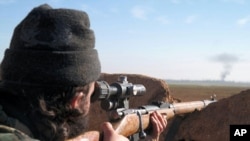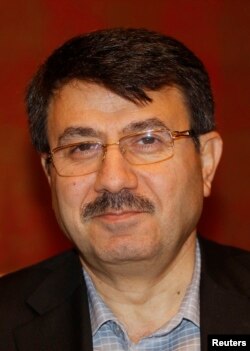Syrian rebel leaders say they hope their recent tactical gains around Aleppo will prompt U.S. leaders to reverse recent cuts in supplies and funding to opposition militias.
Rebel units disrupted an effort by Syrian government forces to surround insurgent-held districts this week in Aleppo. The ancient city in northern Syria was by far the country's most populous and wealthiest area before the ravages of the civil war that is now in its fifth year.
“The advances by our forces on the outskirts of Aleppo show we are to be trusted,” argues Hisham Marwah, vice president of the Syrian National Coalition, the main Western-backed political opposition group to President Bashar al-Assad.
Since December, the Syrian military, together with Shi'ite militias and fighters from the radical Lebanese group Hezbollah, has been trying to encircle rebel-held districts in Aleppo and cut their lines of supply from Turkey. The pro-Assad forces have come close to success several times, but their latest effort to surround the rebels was repelled at the crucial Handarat crossroads.
Rebel fighters recaptured the strategic crossing and also weathered a government effort to capture al-Madafa hill, north of Aleppo, which has a commanding view of the area. Handarat, less than 10 kilometers north of Aleppo, controls the al-Castelo road a key route into Aleppo city.
'No military solution' for Assad
Syrian National Coalition leader Marwah was a lawyer before the anti-Assad uprising began in January 2011. He told VOA the rebels' gains this week are a clear signal that, even “after four years, Assad still can’t defeat the Free Syrian Army and can’t stop the revolution.” Marwah said this also "should send a message to [the Syrian president's] allies, Iran and Russia, that Assad cannot impose a military solution.”
The 52-year-old opposition figure said the rebels' victories at midweek also send a message to the United States: “When they reduce support for the rebel groups they really weaken us, and they reward Assad." Marwah says the Syrian opposition needs more foreign support, which he contends "is the only way Assad will be compelled to accept a political solution."
Three months ago, many of the Syrian rebel groups previously favored by the Obama administration began to see substantial reductions, or even elimination, of their money and supplies from the West. The funding cuts started after two Western-backed militias, Harakat Hazm and the Syria Revolutionaries Front, collapsed in the face of fierce attacks by al-Qaida affiliate Jabhat al-Nusra.
Four of 16 U.S.-approved brigades operating in the northern part of Syria lost their American funding and were dropped from the list of “ratified” militias supported by the U.S., according to a State Department official and opposition sources. Since December, the remaining 12 brigades in the area around Aleppo have seen shortfalls or cuts in assistance. However, funding for dozens of rebel brigades in southern Syria, along with those based in nearby areas of Jordan, has not been affected.
Battlefield performance was not the only reason for the defunding, U.S. officials have indicated. “According to what we heard," Marwah said, "the Americans were afraid that arms supplied to us could fall into the wrong hands.”
Who controls U.S. weapons?
Some U.S.-supplied weapons were captured last month by al-Nusra, the group linked to al-Qaida, and U.S. officials were concerned about the risk that the Islamic State group or al-Nusra militants could gain control over large additional quantities of effective weapons, such as TOW anti-tank missiles.
State Department officials also have said they are concerned that rebel moderates might cooperate with hardcore Islamists in an operational alliance called the Shamiah Front, formed in Aleppo in late December. However, moderate rebels fighting for Aleppo maintain they have no choice but to work with fighters across the ideological spectrum, because not to do so would invite defeat.
“Assad would overwhelm us,” one secular rebel commander told VOA.
The moderate rebels claim they were chiefly responsible for the midweek defeat of Assad’s attempt to encircle them, but it is generally conceded that al-Nusra fighters had the key role in street-to-street fighting in Handarat. Rebel commanders admit that al-Nusra also has been an essential part of various diversionary actions designed to take pressure off opposition fighters in the countryside north of Aleppo city.
Those same commanders acknowledge that a massive tunnel bombing of an air force intelligence building last week was organized by al Nusra. They predict that al-Nusra’s role will only become more prominent if Washington continues to reduce its financial and logistical support. They say that, in turn, will prompt more moderates who oppose Assad to defect and join radical jihadist forces.





